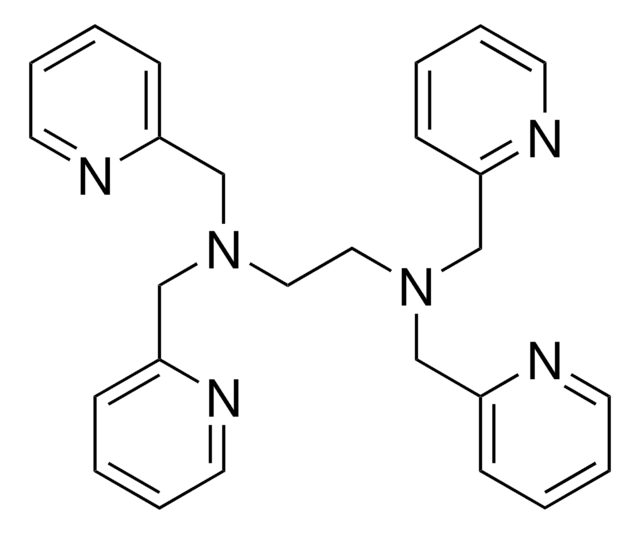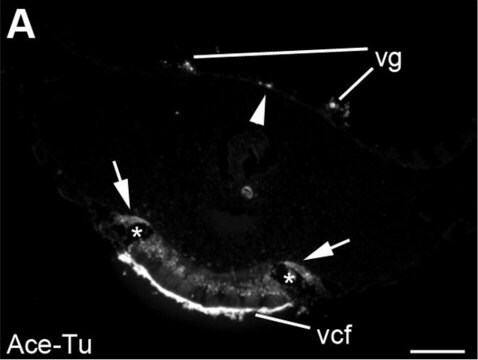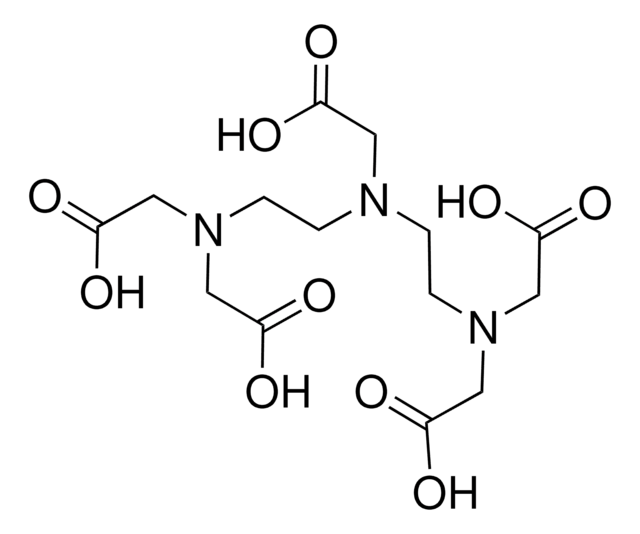616394
TPEN
Synonym(s):
TPEN, N,N,Nʹ,Nʹ- tetrakis-(2-Pyridylmethyl)ethylenediamine
About This Item
Recommended Products
Assay
≥97% (titration)
Quality Level
form
solid
reaction suitability
reagent type: chelator
manufacturer/tradename
Calbiochem®
storage condition
OK to freeze
color
tan
solubility
ethanol: 10 mg/mL
0.1 M phosphate pH 7.0: 25 μM
DMSO: soluble
shipped in
ambient
storage temp.
15-25°C
InChI
1S/C26H28N6/c1-5-13-27-23(9-1)19-31(20-24-10-2-6-14-28-24)17-18-32(21-25-11-3-7-15-29-25)22-26-12-4-8-16-30-26/h1-16H,17-22H2
InChI key
CVRXLMUYFMERMJ-UHFFFAOYSA-N
General description
Application
- Poly(ADP-ribosyl)ation of p53 contributes to TPEN-induced neuronal apoptosis.: This study investigates the role of poly(ADP-ribosyl)ation of the tumor suppressor protein p53 in neuronal apoptosis induced by TPEN, highlighting mechanisms of cell death in neurodegenerative diseases (Kim HL et al., 2015).
- Essential role of p53 in TPEN-induced neuronal apoptosis.: This article explores the critical involvement of the p53 protein in apoptosis initiated by TPEN in neuronal cells, offering insights into potential therapeutic targets for neuroprotection (Ra H et al., 2009).
- Clioquinol induces autophagy in cultured astrocytes and neurons by acting as a zinc ionophore.: Demonstrates how Clioquinol, similar to TPEN, functions as a zinc ionophore to induce autophagy, particularly in neurological contexts, which may be relevant for understanding TPEN′s mechanisms (Park MH et al., 2011).
Warning
Reconstitution
Other Notes
Cherny, R.A., et al. 1999. J. Biol. Chem. 274, 23223.
Aballay, A., et al. 1995. Biochem. J.312, 919.
Jiang, S., et al. 1995. Lab. Invest.73, 111.
Sheridan, R.E. and Deshpande, S.S. 1995. Toxicon33, 539.
McCabe, M.J., et al. 1993. Lab. Invest. 69, 101.
Hinkle, P.M., et al. 1992. J. Biol. Chem.267, 25553.
Baba, A., et al. 1991. Brain Res. 557, 103.
Forbes, I.J., et al. 1991. Exp. Cell Res. 195, 224.
Csermely, P. and Somogyi, J. 1989. J. Cellular Physiol.138, 593.
Raspe, E., et al. 1989. Eur. J. Pharmacol.163, 345.
Arslan, L.P., et al. 1985. J. Biol. Chem.260, 2719.
Legal Information
Storage Class Code
11 - Combustible Solids
WGK
WGK 3
Flash Point(F)
Not applicable
Flash Point(C)
Not applicable
Regulatory Listings
Regulatory Listings are mainly provided for chemical products. Only limited information can be provided here for non-chemical products. No entry means none of the components are listed. It is the user’s obligation to ensure the safe and legal use of the product.
JAN Code
616394-100MG:
616394-VMG:
Certificates of Analysis (COA)
Search for Certificates of Analysis (COA) by entering the products Lot/Batch Number. Lot and Batch Numbers can be found on a product’s label following the words ‘Lot’ or ‘Batch’.
Already Own This Product?
Find documentation for the products that you have recently purchased in the Document Library.
Customers Also Viewed
Our team of scientists has experience in all areas of research including Life Science, Material Science, Chemical Synthesis, Chromatography, Analytical and many others.
Contact Technical Service











